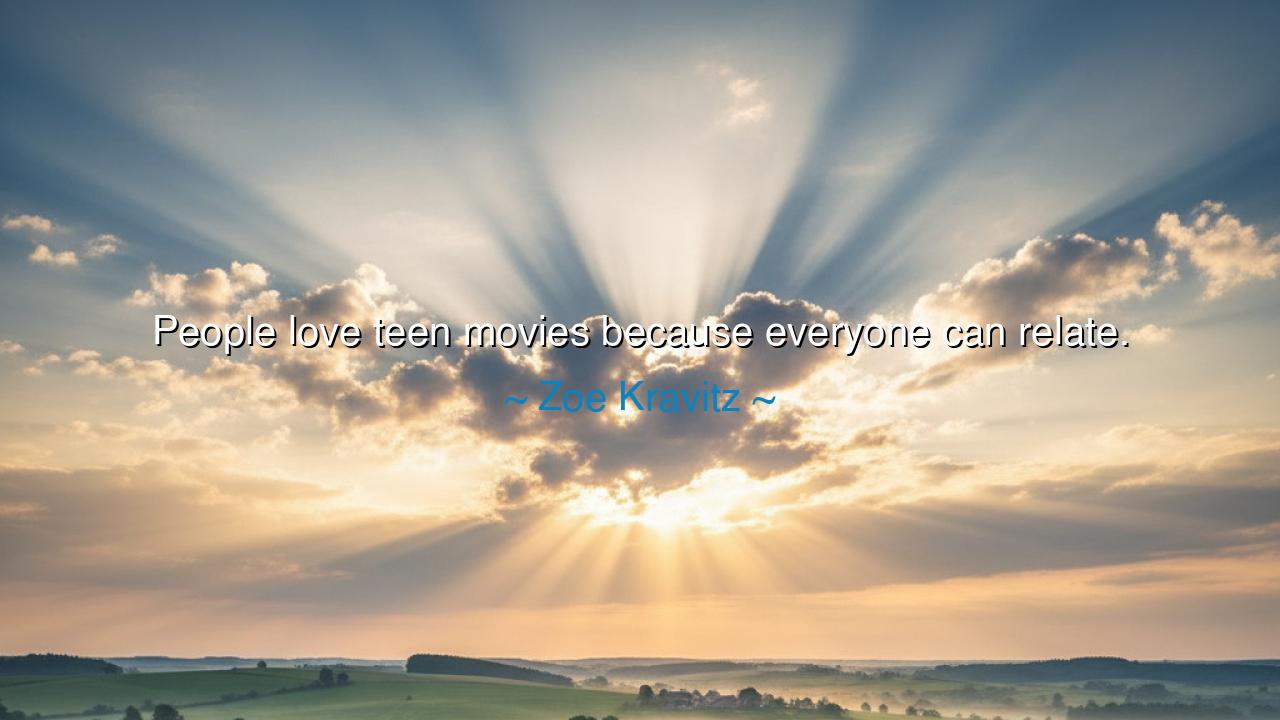
People love teen movies because everyone can relate.






When Zoë Kravitz declared, “People love teen movies because everyone can relate,” she spoke to a truth deeper than the screen itself. Teen movies endure because they remind us of a time when life burned with intensity—when love was new, friendships fragile, and every triumph or heartbreak felt like the crest of a wave. Whether young or old, we have all walked through that threshold, that sacred passage of adolescence, where identity is forged in the fire of struggle and longing. Her words remind us that these stories are not merely about youth, but about the universal journey of becoming.
The origin of her statement lies in the very structure of storytelling. From the ancients to our modern age, tales of youth have been told again and again, for in them lie the seeds of the human condition. The Greeks gave us the myths of Achilles and Odysseus, whose journeys began in their youth. Shakespeare filled his stage with passionate young lovers like Romeo and Juliet, whose fleeting days burned brighter than many lifetimes. In the same way, the teen films of modern culture carry echoes of these old stories, reminding us of who we were, and awakening empathy for who others are becoming.
Consider the story of The Breakfast Club, a film that gathered five teenagers from different walks of life and placed them in a single room. Stripped of their masks, they revealed not stereotypes, but human souls yearning for acceptance, understanding, and freedom. Though decades old, the film still resonates, for the struggles it portrays—loneliness, identity, pressure, hope—are not bound to any one era. It proves Kravitz’s words: everyone can relate, for everyone has felt these storms within.
Relatability is the bridge between art and life. Teen movies are powerful not because they portray extraordinary deeds, but because they reveal the ordinary trials we all endure—falling in love, facing rejection, questioning who we are. These are rites of passage that cut across time, culture, and age. Even as the decades change the fashions and the music, the heartbeat of youth remains the same. To watch these stories is to remember our own, to feel the spark of recognition, and to know we are not alone in our journey.
The deeper lesson is that these stories remind us of our shared humanity. When an elder watches a teen film, they recall the tenderness of their own beginning, softening the heart toward those who now walk that road. When the young watch, they see their struggles reflected and validated, gaining courage to move forward. Thus, teen movies become more than entertainment; they become mirrors in which each generation sees both itself and one another.
The wisdom we must take is that while the body ages, the memory of youth remains etched into the soul. To connect with those memories is to retain compassion, humility, and joy. Kravitz teaches us that the love of such films is not trivial—it is a recognition of the eternal cycle of growth, the bond between past and present selves. In remembering our own youth, we are better able to guide, nurture, and understand the youth of today.
Practical counsel follows: do not scorn the stories of youth, nor dismiss them as simple. Instead, honor them, revisit them, and learn from them. Speak with the young not as strangers, but as fellow travelers on the same path, for you too have stumbled through the same valleys. If you are young, know that the struggles you face are shared by generations before you; if you are older, know that the young walk now where you once walked. In this mutual recognition lies the seed of wisdom, empathy, and unity.
Thus, let us engrave Kravitz’s words upon the heart: people love teen movies because they remind us that we are all bound by the same passages of life. To relate is to connect, and to connect is to heal. And so, the stories of youth—whether told on the stage of the ancients or the screen of today—remain sacred torches, lighting the path of humanity across the ages.






AAdministratorAdministrator
Welcome, honored guests. Please leave a comment, we will respond soon